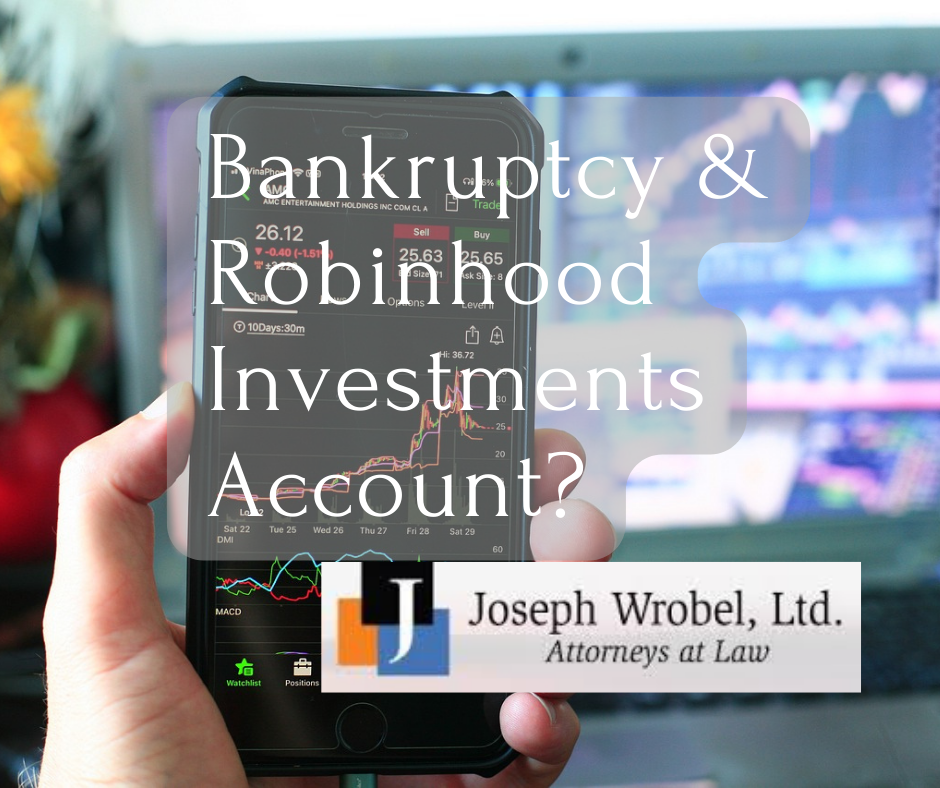Navigating Bankruptcy: What Happens to Your Robinhood Investments Account?
Filing for bankruptcy can be daunting, especially considering its impact on various assets and investments. Among these concerns, individuals often wonder about the fate of their investment accounts, such as those held with popular platforms like Robinhood. In this comprehensive guide, we’ll explore what happens to your Robinhood investments account in the event of bankruptcy, providing clarity and insight into this crucial matter.
Navigating bankruptcy can be overwhelming, especially when considering the fate of your investments. Joseph Wrobel, a seasoned Chicago bankruptcy lawyer, offers comprehensive legal guidance to individuals facing financial challenges. With a deep understanding of bankruptcy law and a commitment to client advocacy, Joseph Wrobel provides personalized solutions to protect your assets and confidently guide you through bankruptcy. Whether you’re concerned about your Robinhood investments or other financial matters, Joseph Wrobel Ltd. is here to provide expert counsel and support every step of the way.
Understanding Bankruptcy and Asset Treatment
Before delving into specifics, it’s essential to grasp the fundamentals of bankruptcy and how different assets are treated within this legal framework. Bankruptcy is a legal proceeding that provides individuals or businesses with debt relief by allowing them to restructure their finances or discharge certain debts.
Assets are categorized into various types, including exempt and non-exempt assets:
Exempt assets: These are assets protected by law from being seized by creditors during bankruptcy proceedings. Examples typically include primary residences, retirement accounts, and personal belongings.
Non-exempt assets: These may be liquidated to repay creditors during bankruptcy. Examples can include investments, cash savings, and secondary properties.
Treatment of Robinhood Investments Accounts in Bankruptcy
Regarding Robinhood investment accounts, their treatment in bankruptcy largely depends on the type of bankruptcy filed (Chapter 7 or Chapter 13) and the value of the investments held within the account. Let’s explore the potential scenarios:
1. Chapter 7 Bankruptcy:
Liquidation of Non-Exempt Assets: In Chapter 7 bankruptcy, non-exempt assets are typically liquidated to repay creditors. Robinhood investment accounts may fall into this category if they exceed the exemption limits set by federal or state law.
Exemption Considerations: Depending on applicable exemption laws, some or all of your Robinhood investments may be protected. Consulting with a knowledgeable bankruptcy attorney, such as Joseph Wrobel, Ltd., can help determine the extent of protection available in your case.
Potential Losses: If your Robinhood investments are non-exempt and exceed the allowable limits, they may be liquidated to satisfy creditor claims. However, exemptions and legal strategies may mitigate potential losses.
2. Chapter 13 Bankruptcy:
Repayment Plan: Unlike Chapter 7, Chapter 13 bankruptcy involves creating a repayment plan to satisfy debts over a specified period, typically three to five years.
Protection of Assets: In Chapter 13, individuals retain their assets while adhering to the court-approved repayment plan. This can include maintaining ownership of Robinhood investment accounts, provided they are included in the plan and payments are made as required.
Value Considerations: The value of your Robinhood investments may influence the terms of your repayment plan. Accurately assessing and disclosing the value of these investments is crucial to ensuring compliance with bankruptcy regulations.
Tips for Protecting Your Investments
While bankruptcy can present challenges for investors, there are proactive steps you can take to protect your investments, including those held with Robinhood:
Consult with a Bankruptcy Attorney: Seeking guidance from a qualified bankruptcy attorney, such as Joseph Wrobel Ltd., can help navigate complex legal matters and maximize asset protection strategies.
Review Exemption Laws: Familiarize yourself with federal and state exemption laws to understand the protection available for your investments.
Consider Timing: Timing can be critical when contemplating bankruptcy. Consulting with an attorney early on can help assess your options and implement strategic measures to safeguard your assets.
Maintain Accurate Records: Keep thorough and up-to-date records of your investments, including transaction history, account statements, and valuations. This documentation can be invaluable during bankruptcy proceedings.
Conclusion
Navigating bankruptcy can be overwhelming, especially concerning the fate of your investments, including those held with platforms like Robinhood. You can approach the process with clarity and confidence by understanding how these assets are treated in bankruptcy, exploring exemption options, and seeking guidance from experienced professionals like Joseph Wrobel, Ltd. Remember, proactive planning and informed decision-making are vital to protecting your financial interests during challenging times.

 Subscribe to CB on YouTube!
Subscribe to CB on YouTube!